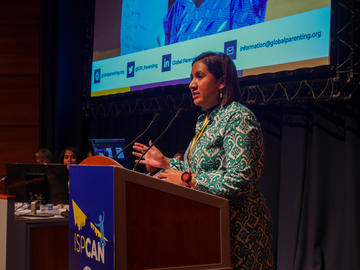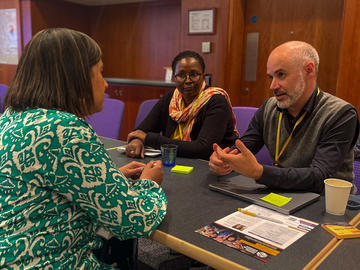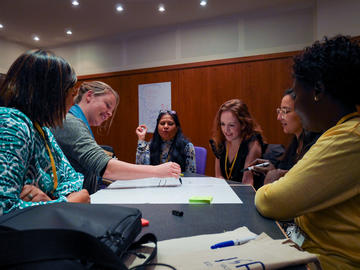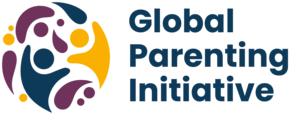Learning from and for practice
Communities of Practice (CoPs) have been integral to various forms of collective learning for decades. Whether it be indigenous people adapting to survive, a group of community practitioners strategising to address a societal issue, or a network of surgeons exploring a novel technique, these entities have thrived. However, the formal terminology "community of practice" was only coined in the past decade. Its roots lie in learning theory, underscoring the role of social learning activities in creating environments conducive to profound and meaningful discussions.

As defined by Wegner et al. (2002), CoPs are groups of individuals united by a shared concern for real-world issues, engaging in the mutual exchange of knowledge to effect change. Importantly, the learning dynamic within a CoP extends beyond the conventional model of knowledge transmission; it involves a continuous cycle wherein community members generate ideas, implement them, and subsequently refine their understanding through reflective practices.
There are essential three fundamental elements to establish a CoP: 1) a shared domain of interest, 2) a community of individuals eager to engage and learn within the specified domain, and 3) shared practices encompassing the exchange of experiences, narratives, resources, and problem-solving approaches. CoPs are not constrained by formal or organisational structures, often commencing modestly and expanding organically. This lack of formal bounds allows CoPs to forge connections among individuals irrespective of organisational or geographic constraints, facilitating multidisciplinary engagement.
GPI hosts a number of CoP events to provide the opportunity for stakeholders to engage in a wide range of topics in the areas of parenting and prevention of violence against children. Examples of this include our Open Webinar Series and our pre-conference workshop at the recent International Society for the Prevention of Child Abuse and Neglect (ISPCAN) conference in September 2023, that brought together a large audience to speak specifically on the scale-up of parenting programmes. CoP in action can truly take on many different forms.
While CoPs may lack formal structures, the adoption of guiding principles, objectives, outcomes, and a frequency of engagement, decided by the community itself, proves beneficial. These guidelines aid in operationalising CoP objectives and fostering collective learning to address real-world challenges. Internally to the GPI there are a number of theme-based communities of practice groups. We call these Playful Learning Groups where specific terms of reference have been developed to provide guidance in terms of how often they meet and how best to engage (i.e. via regular meetings or chat groups).

Wenger-Trayner et al. (2023) aptly describe CoPs as entities capable of creating human bridges across silos. Unlike formal structures demanding top-down alignment, CoPs enable members to adapt ideas to fit their specific contexts. Each CoP is unique in its structure, domain of interest, and participating members, contributing to and benefiting from collective learning to address practical challenges.
The global, fast-paced nature of our world makes it challenging to stay abreast of innovations. CoPs offer a solution by empowering practitioners to collectively take responsibility for their learning, occasionally seeking expert input but maintaining control over the learning process. CoPs establish a direct link between learning and engagement in practice, ensuring that insights are translated into actionable outcomes. The GPI has a number of established networks and relationships with partners ranging from large organisations such as the LEGO Foundation to universities across the globe such as Makerere University in Uganda to local implementing partners including Clowns Without Borders South Africa and the Peace Culture Foundation in Thailand to name a few.
Furthermore, GPI forms part of a coalition of partners known as the Global Initiative to Support Parents (GISP), which includes, WHO, UNICEF, Parenting for Lifelong Health (PLH), the Early Childhood Development Action Network (ECDAN), and the Global Partnership to End Violence Against Children (EVAC) was was formed in a response to the challenges caregivers experienced by the COVID-19 pandemic.This partnership has created a multitude of engagement platforms and opportunities to share and learn from each other and their extended networks.
Since July 2019, the Global Initiative to Support Parents (GISP) has been organising parenting conferences in six regions worldwide, developing learning platforms and bringing together donors regularly. The ultimate vision of the GISP, is to support country-led and owned efforts, so that every family is supported in their caregiving practices and that children who face vulnerabilities receive the support that they need.

Communities of practice are prevalent in all sectors of society, including organisations, government, education, research and development, and social or civic sectors. In the realm of research and development, CoPs play a pivotal role by fostering spaces for researchers to connect, collaborate, and share knowledge. They contribute to trust, transparency, and knowledge-sharing among researchers from diverse backgrounds and geographic locations, accelerating research by providing access to varied expertise, data, and resources. Moreover, CoPs promote diversity and inclusion by providing a platform for underrepresented voices, facilitate interdisciplinary research, aid in translating findings into policy and practice, and enhance the relevance and visibility of research by connecting it to real-world challenges and needs.
Communities of practice serve as invaluable mechanisms, uniting individuals driven by a common desire to learn and share insights to refine their practices in addressing real-world challenges.
References:
Wenger, E.; McDermott, R. & Snyder W.M. (2002). Cultivating Communities of Practice. Boston, MA: Harvard Business School Press.
Wenger-Trayner, E; Wenger-Trayner, B.; Reid, P. & Bruderlein, C. (2023). Communities of practice within and across organisations: A guidebook. Social Learning Lab. https://www.wenger-trayner.com/wp-content/uploads/2023/06/23-06-08-Community-Of-Practice-digital.pdf




